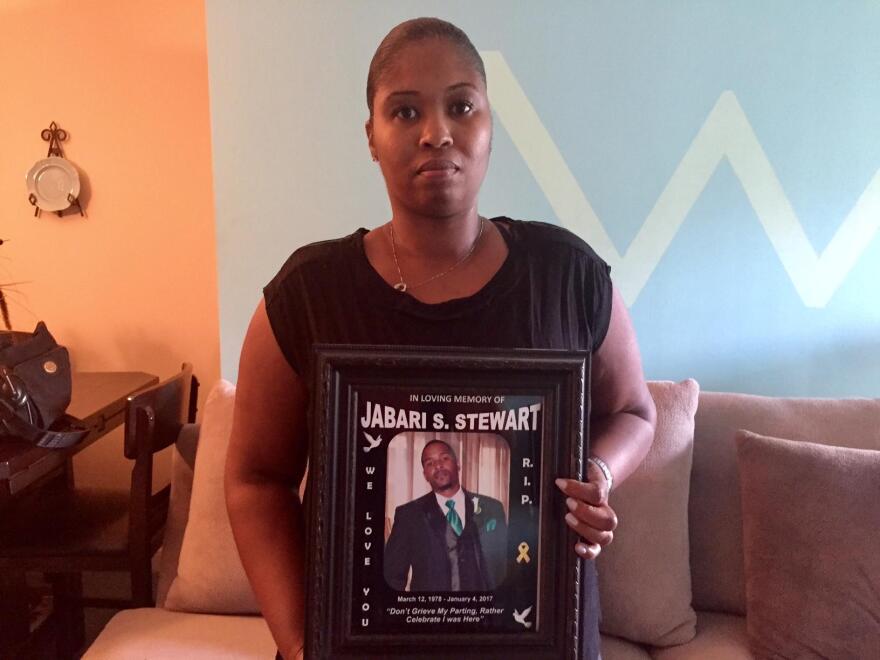In 2017, Charlotte felt a rise in the city’s homicide count. There were 85 that year. Twenty-four of those cases are still open, including the killing of 38-year-old Jabari Stewart. Patrice Warren, Stewart’s sister, spoke with WFAE’s Sarah Delia shortly after his death as the family tried to deal with the sudden loss.
The homicide issue hasn’t gone away in Charlotte. We’ve already seen 66 homicides this year. And it’s the topic of Tuesday night’s Public Conversation event at Friendship Missionary Baptist church hosted by WFAE’s Mike Collins.
Before that conversation, we wanted to hear more from Patrice Warren about the years after her brother’s death. She also shares her thoughts on the city’s growing violence.
When Patrice Warren moved from New Jersey to Charlotte in 2009, it was for a simple reason — to be near her baby brother Jabari. The siblings were six years apart. Patrice says she was always looking out for her brother, even as adults. So when he was killed in January of 2017, her world stopped.
"Who are you without what you do for everyone else? With Jabari, that was part of the tragedy. Because who do you then care for?" Warren reflected. "Who do you take care of? And in this case Jabari was also confidant, my biggest cheerleader. So who is going to do that for me as well?"
Jabari Stewart was shot in his home and Warren says they still have no idea who committed the crime. In the aftermath of her brother’s death in 2017, what bothered her most was not understanding why this happened to Jabari. Over two years later, she still doesn’t have a clue.
"Death is tragic in itself but murder is a different beast. It’s not something you can prepare for," Warren said. "It’s not a road map they give you to navigate it. It’s more than losing a family member. He was a friend, a confidant. To have that major piece of your life to be taken away abruptly, you just have to go according to where the day takes you."
Jabari’s case is still an open case being investigated by the Charlotte Mecklenburg Police Department, but Patrice says there are few updates.
Patrice’s family decided to relocate to outside of Charlotte after Jabari’s death — close enough if there was a break in the case to be able to travel back and forth for meetings with the police or district attorney, and far enough from the constant reminder of his death.
"Crime can happen anywhere and anytime to anyone — if I didn’t know that, I know that now," Warren said. "But being right in the middle of Charlotte. It just felt stressful at times to just move about day to day. The violent way he was taken just adds a different element to how you live your life and how you think about your life day to day. Being removed from the immediate area that I was in or that he lived in at the time that he lived in at the time he lost his life has taken some of that edge off."
[Related: 'I Always Want To Be Part Of The Solution.' Reflections On Charlotte's Homicide Count]
While the move helped some, it didn’t completely curb the anxiety the family feels about the nature of Jabari’s death. There are still the same unanswered questions: Why Jabari? What happened in the moments leading up to his death? Why does this keep happening in Charlotte? And who is committing this violence?
"I do believe that individuals are responsible for their own behaviors, their own thoughts, so the individuals that are committing these crimes, they are responsible for how they chose to work through whatever the problem is that they are having that brought them to this," Warren said. "That is my thought. I don’t think that has changed from when Jabari lost his life to prior him losing his life. It all deals with individual people and how they chose to deal with their conflicts."
These questions remain for Patrice and the family. But one thing has changed since 2017. She decided it was time to go back to school and work on getting her master’s degree — she wants to be a therapist and specifically work on bereavement counseling. Jabari’s death was the catalyst for this new career path.
Her faith she says, gives her some solace that although she doesn’t understand why this happened, there was some reason behind it.
"I do believe prayer helps, I will say throughout this experience for me..." Warren trails off here and takes a moment to gather her thoughts.
"My greatest support has been securing a spiritual relationship and believing that I will see him again. So I think that making sure you have a spiritual foundation is what has been most helpful to me and I think that would be helpful to most people."
And Patrice spends a lot of time thinking about people just like her who have lost someone close to them, trying to figure out how to make sense of violence. She sees and feels the increased violence in Charlotte even from a distance. And she sees and feels for the families left behind.
"It's in the news today, it’s going to be in the news over the weekend and then you’ll hear bits and all throughout the month but then it goes away and even some of the friends and distant relatives it will be a distant thought for them," Warren said. "But the people who remain with this loss, next year, those are the people I think about."
She’ll continue to think about those people partly because she’s one of them. One of the many in the community trying to keep her loved one's memory alive in a news cycle full of stories that are too painfully close to her own.




